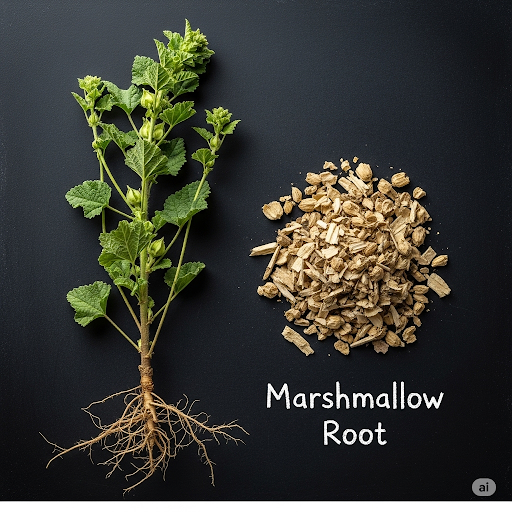
Marshmallow Root
Marshmallow root (Althaea officinalis) is an herb with a long history of use in traditional medicine, particularly for its soothing properties. Its primary benefits are attributed to its high mucilage content, a gel-like substance that forms a protective layer when mixed with water.
Here are some of the key benefits associated with marshmallow root:
Respiratory and Throat Health
Soothing Coughs and Sore Throats: The mucilage in marshmallow root can coat the mucous membranes of the throat, mouth, and esophagus, providing a soothing effect that helps to relieve irritation and dry coughs. This makes it a common ingredient in natural cough syrups and lozenges.
Expectorant Properties: It may also act as an expectorant, helping to thin mucus and make it easier to cough up, which can be beneficial for conditions like bronchitis.
Digestive Health
Protecting the Digestive Tract: The same soothing action that benefits the throat also works for the digestive system. The mucilage can form a protective layer over the lining of the stomach and intestines, potentially helping to relieve irritation from conditions like heartburn, gastritis, and peptic ulcers.
Relieving Digestive Discomfort: It may help to soothe inflammation and irritation in the gut, which can be helpful for conditions like "leaky gut" syndrome, constipation, and diarrhea.
Skin and Wound Healing
Soothing Skin Irritation: When applied topically in creams or salves, marshmallow root's anti-inflammatory properties can help calm skin irritation from conditions like eczema, dermatitis, and boils.
Promoting Wound Healing: Research suggests that marshmallow root has antibacterial properties that may help to fight certain types of bacteria and speed up the healing process of wounds.
Other Potential Benefits
Diuretic Action: It may act as a mild diuretic, helping the body to flush out excess fluid and cleanse the kidneys and bladder. This can be beneficial for urinary tract health.
Hair and Scalp Health: Due to its moisturizing and soothing properties, marshmallow root is sometimes used in hair care products to detangle, soften, and hydrate hair.
Important Safety Considerations
While marshmallow root is generally considered safe for most people, it's important to be aware of the following:
Drug Interactions: The mucilage in marshmallow root can interfere with the absorption of other oral medications. To avoid this, it's recommended to take marshmallow root at least an hour after any other medications.
Lack of Human Studies: While many of its uses are supported by centuries of traditional use and some promising animal and lab studies, more large-scale human research is needed to fully confirm its efficacy for many of these conditions.
Consult a Professional: As with any herbal remedy, it's always best to consult with a healthcare provider or a qualified herbalist before using marshmallow root, especially if you are pregnant, breastfeeding, or have a pre-existing medical condition.
Sources
Marshmallow root (Althaea officinalis) is an herb with a long history of use in traditional medicine, particularly for its soothing properties. Its primary benefits are attributed to its high mucilage content, a gel-like substance that forms a protective layer when mixed with water.
Here are some of the key benefits associated with marshmallow root:
Respiratory and Throat Health
Soothing Coughs and Sore Throats: The mucilage in marshmallow root can coat the mucous membranes of the throat, mouth, and esophagus, providing a soothing effect that helps to relieve irritation and dry coughs. This makes it a common ingredient in natural cough syrups and lozenges.
Expectorant Properties: It may also act as an expectorant, helping to thin mucus and make it easier to cough up, which can be beneficial for conditions like bronchitis.
Digestive Health
Protecting the Digestive Tract: The same soothing action that benefits the throat also works for the digestive system. The mucilage can form a protective layer over the lining of the stomach and intestines, potentially helping to relieve irritation from conditions like heartburn, gastritis, and peptic ulcers.
Relieving Digestive Discomfort: It may help to soothe inflammation and irritation in the gut, which can be helpful for conditions like "leaky gut" syndrome, constipation, and diarrhea.
Skin and Wound Healing
Soothing Skin Irritation: When applied topically in creams or salves, marshmallow root's anti-inflammatory properties can help calm skin irritation from conditions like eczema, dermatitis, and boils.
Promoting Wound Healing: Research suggests that marshmallow root has antibacterial properties that may help to fight certain types of bacteria and speed up the healing process of wounds.
Other Potential Benefits
Diuretic Action: It may act as a mild diuretic, helping the body to flush out excess fluid and cleanse the kidneys and bladder. This can be beneficial for urinary tract health.
Hair and Scalp Health: Due to its moisturizing and soothing properties, marshmallow root is sometimes used in hair care products to detangle, soften, and hydrate hair.
Important Safety Considerations
While marshmallow root is generally considered safe for most people, it's important to be aware of the following:
Drug Interactions: The mucilage in marshmallow root can interfere with the absorption of other oral medications. To avoid this, it's recommended to take marshmallow root at least an hour after any other medications.
Lack of Human Studies: While many of its uses are supported by centuries of traditional use and some promising animal and lab studies, more large-scale human research is needed to fully confirm its efficacy for many of these conditions.
Consult a Professional: As with any herbal remedy, it's always best to consult with a healthcare provider or a qualified herbalist before using marshmallow root, especially if you are pregnant, breastfeeding, or have a pre-existing medical condition.
Sources